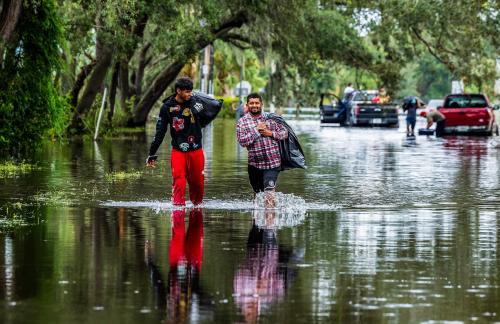

10:00 am EDT - 5:00 pm EDT
Past Event
10:00 am - 5:00 pm EDT
1775 Massachusetts Avenue NW
Washington, DC
20036
The Tōhoku earthquake and tsunami of March 11, 2011 (3/11) had both immediate and long-term consequences. Over 20,000 people lost their lives in the triple disaster, hundreds of thousands were displaced and the economic costs were the highest ever to result from a natural disaster. Since the disaster, however, both Japan and the international community have sought to learn from this tragedy by drawing lessons for preventing, responding to, and rebuilding after natural disasters. Specifically, the Government of Japan and the World Bank launched the Sendai Dialogue in October 2012 as a way to re-conceptualize the role of disaster risk management (DRM) in development strategies, emphasizing the importance of building resilience against natural disasters.
On May 10, the Center for Northeast Asian Policy Studies and the Brookings-LSE Project on Internal Displacement co-hosted a discussion featuring experts on natural disasters and disaster risk management from the United States and Asia. Panelists representing the private, public, and international sectors sought to refine some of the topics considered at the Sendai Dialogue. They identified the lessons learned from 3/11; how these lessons can be applied to overseas economic assistance programs, focusing on DRM; the specific challenges of disaster risk management among Asian countries; and how DRM can be integrated and mainstreamed into development assistance across different platforms.
1:30 pm
10:00 am

Earthquake and Tsunami Countermeasures in Japan by Yoshiaki Kawata
Japan’s Response to 3/11: Eight Lessons for Disaster Risk Management by Leo Bosner
Lessons Learnt from Japanese Red Cross Response to 3/11 by Naoki Shiratsuchi
The Fukushima Nuclear Accident: A Social Science Perspectiveby Daniel Aldrich
12:00 pm

3:15 pm
Donor Perspectives: Building Disaster Resilience in DFID by Stewart James
Enterprise Resilience Rated Loan Program: Growth & Resilience by Yoshiki Hiruma
Mainstreaming DRM in Development Assistance by Francis Ghesquiere
Mainstreaming Disaster Risk Reduction into Development in UNDP by Angelika Planitz


Elaine Kamarck
July 2, 2025

Homi Kharas, Junjie Ren
March 17, 2025

Vanessa Williamson, Ellis Chen
January 21, 2025